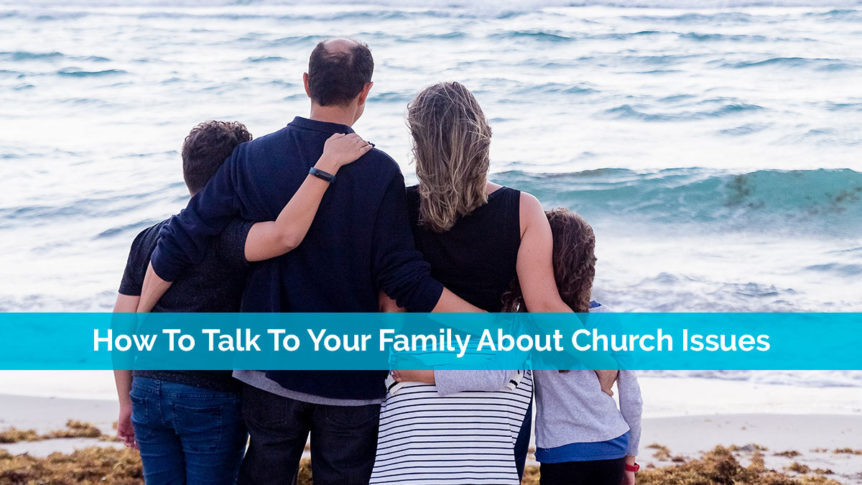Whether it’s church leaders or church members, it’s important to talk with your family when church issues arise.
Not only is it a good idea to talk things out, especially if you disagree on the issue. But, you may find that talking with your family helps you find a resolution.
The most important thing to remember is you shouldn’t shut your family out. By working and worshiping together, you create a stronger bond and a better church. All of the advice below applies to individual families and your entire church family too.
Eliminate Distractions
The very first step to talking about church issues is to eliminate distractions. The last thing you need while you’re trying to discuss something important is having some people not paying attention. This may mean banning phones/tablets.

Ideally, you’ll want to talk about things in a quiet, yet comfortable area. At home, this may mean your living room. At church, this could be an unused meeting room. Just make sure to at least limit distractions so everyone stays focused. After all, issues with your church need to be taken seriously.
Schedule A Family Meeting
If you’re discussing church issues as a church leader with your entire church family, you may be tempted to do this during regular services. However, this can feel awkward for everyone involved. Plus, many people may have to leave due to other obligations, such as work.
Instead, schedule a family meeting. Try to find a time when as many people as possible can attend. To make it easier, you may want to hold multiple meetings. For individual families, a single meeting is all that’s necessary.
For churches, advertise this meeting on social media and your church website. You can even send out SMS reminders for those who have signed up to attend. Make sure everyone knows that the start time is when the meeting actually starts and not just when to arrive.
Be Respectful Of Differing Opinions
There are a few major rules when discussing church issues with your family. The first is to always be respectful of differing opinions. For instance, if there are disagreements about how church funds are spent, don’t lash out at those who have a different opinion. After all, this is the whole point of the meeting.
Respect sometimes is easily overlooked. You get angry, frustrated and even disappointed, but showing respect is the first step toward gaining respect. While The Balance Careers focuses on businesses, their list of tips on how to be more respectful apply to everyone, including the church.
Your meeting could end up as a yelling match or just one person talking. Or, it could be a highly productive discussion where you learn more about each other and come up with a resolution for your church issues. Respect isn’t always easy, but it’s worth the effort.
Give Everyone A Chance To Speak
This is where it gets even harder. Most people probably already have their mind set on what they think the main issue is and what should be done about it. Why bother to hear anyone else out?
The problem is everyone needs to have a chance to speak. They don’t have to if they don’t want to, but the opportunity should be there.
For individual families, go around the room and give everyone a set amount of time to speak their mind. As the discussion progresses, you’ll want to do this multiple times. While the person is speaking, no one else speaks unless it is to politely ask a question or for clarification.
Think of it as a classroom. You paid attention to the teacher and didn’t speak out of turn until you were called on. In this case, everyone is a teacher taking their turn speaking.
For church families, you may want to offer alternative ways to speak. If you have hundreds of people attending your meeting, it’s going to be impossible for everyone to get a chance to talk.
Instead, place a form on your church’s website for everyone to submit their concerns and opinions. These can be anonymous if members aren’t comfortable speaking out. Of course, this alone is likely an issue as this means members are afraid of retaliation. So, this may be an issue to bring up as well. Of course, it may just mean you have a few shy members too.

You can also have a Q&A session on social media or as a live stream. By having people sending in their thoughts, it’s easier and faster to go through everything.
If you gather thoughts before the meeting, make sure you go through all of them. Odds are, they’ll be fairly easy to place into groups so you know the prevailing thoughts of your entire church family.
For church meetings, ask members to please send in more of their thoughts and opinions afterward. Be sure to tell them how to submit their thoughts, such as via your website or social media.
Explain Things To Smaller Children
Often times, smaller children are left out of discussions about church issues. However, if they’re growing up in the church, they deserve the chance to know what’s going on. While it’s not always easy to explain things, try to simplify issues so they can understand.
For instance, if there is infidelity among church leaders, kids are likely to hear about it as it affects the entire church. When they ask questions, be prepared to explain what it all means.
Thanks to the innocent, yet highly intelligent minds of children, you might just find they have reasonable solutions that you would have never thought of. Churches can actually hold meetings for children for issues that may affect all the children in the church.
Describe The Issue Clearly
No matter how you’re discussing church issues or with whom, describe the issue clearly. Don’t just say, I hate the new music. Instead, explain that you’re not comfortable with the way the new music expresses faith-based messages or you can’t understand the words, so you can’t figure out how it’s helpful.
The more you explain the issue with facts, the easier it is to discuss it reasonably. Far too often, discussions turn into arguments simply because no one fully understands the problem.
Another example is saying that you don’t think the church is spending money the right way. That’s a good start, but where do you believe they’re going wrong? Perhaps, you believe the focus should be more on the community versus making the church building larger or vice versa.
For individual families, let everyone explain what they believe the issue is. For entire church families, ask people to submit what they believe the problem is. You can also talk about what you feel the issue is when you announce how to submit their thoughts and when everyone can meet to discuss it.
Understand How The Issue Affects You
While you’re talking, talk about how the issue affects you personally. Why do certain church issues affect you? Going back to the discussion about music, is it the message or just the style of music that you dislike?
General statements, especially when they go against what others believe, don’t add to the discussion. This just makes you sound like you’re disagreeing to be difficult.
Instead, express the effects of the issue on you personally. This gives everyone else more insight into you and makes your issues more relatable. You might just find that others understand your point better and may even agree with you.

Identify If Other Issues Exist
When you’re talking about church issues with your family, try to find any other issues that be causing this one or other issues this one is creating. For instance, a few church leaders who refuse to embrace change may be creating an entire group of issues.
It’s not uncommon for older church leaders to want to avoid newer approaches, such as creating a church website or videoing sermons to show online. However, these issues could be resulting in less member engagement, fewer new members, people leaving the church and fewer younger members.
It’s a good idea to try and address all the issues instead of just one. In fact, you might find that finding the root cause will fix all the other issues.
Never Place Blame
One final rule to remember when talking about church issues with your family is to never place blame. It’s easy to play the blame game, whether it was originally your fault or not. But, that won’t help the discussion or help you find a resolution.
For example, if the church’s child ministry program is scaring children versus teaching them, you might immediately blame the teacher. However, you could also accept blame for not noticing how your child felt about the program and taking action sooner.
Instead of blaming anyone, talk about what’s wrong and why. Then, work toward a resolution. For instance, a resolution would involve first talking with the teacher and/or church leaders. If that doesn’t work, you’d take your child out of the program.
Consider Everyone’s Role In The Church
When discussing church issues, consider everyone’s individual roles in the church. A church leader may not see an issue the same as a new member or vice versa. Teens might notice issues that their parents don’t. Volunteers in different programs might have completely unique issues to talk about.
Just because you don’t have or notice an issue personally, doesn’t mean it doesn’t exist. Take time to better understand issues from others’ perspectives based on what role they play in the church.
This means even if a brand new member brings up an issue, it’s worth listening to and discussing. You might discover that others in your church family are having this problem too, but just haven’t spoken up yet.
Discuss Resolutions Within The Church
Sometimes, disappointments with the church can lead to life-changing decisions, such as leaving the church completely. Before taking any drastic actions, it’s important to discuss resolutions within the church.
For instance, a volunteer might be feeling burned out. They talk with their family at home about how they feel. They would then discuss the issue with church leaders. It may be time for them to move on to a different opportunity. Or, they may find that still love the church, but prefer to volunteer outside the church.
Churches aren’t perfect and never will be. After all, they are run by humans, who aren’t perfect either. This means churches must be open to positive changes.

It’s important to discuss how any changes will affect everyone in the church. For major changes, discuss them with the entire church family. You can use polls on social media and your church’s website to let members vote on what they prefer. Having a detailed blog post explaining the original issue and possible resolutions is helpful.
Determine Next Steps
Finally, determine any next steps to take. These might include further discussions or making changes within the church. It’s also important to talk about how an issue came to be and why it wasn’t brought up sooner.
It may be time to start a regular forum, either online or in your church, to talk about any issues regularly before they become major problems. For individual families, make the trip home from church each week about talking about the sermon and any church issues on your family’s minds.
Also, make it clear to everyone in your church family that they can bring up problems. Sometimes, the easiest method is online since it’s convenient. However, set hours for hearing out members.
Respect Everyone’s Final Wishes
The single most important thing to remember is to respect everyone’s final wishes when discussing church issues. You don’t want to burn bridges. While you may not agree with them, respect someone else’s choices.
Even after talking things out with your teenager, they may not want to attend your church any longer. They might prefer a different church with a better teen ministry program. Respect this and work things out so they can attend the other church.
If members voted and prefer traditional hymns over contemporary music, respect this and don’t complain. Instead, listen to contemporary Christian music in your car to and from services.
A great way to aid in the discussion process is to have a church website to introduce issues, schedule meetings and even guide families in their at-home discussions. Contact us today to create an engaging and helpful site for your church.




